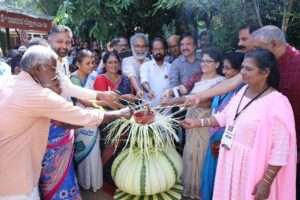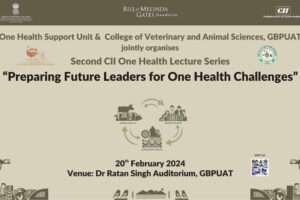GFRAS recently organised a meeting on the development of learning materials to build capacity for extension evaluation at the regional and national levels. Rasheed Sulaiman V who participated in this meeting shares his experiences here.
CONTEXT


Evaluation is a relatively weak area in extension. The Global Forum for Rural Advisory Services (GFRAS) recognised the importance of strengthening evaluation in extension and produced a Guide to Evaluating Rural Extension in 2012. (As background to the Guide, a meta-evaluation of extension evaluations and a meta-review of methods were also conducted). Over the last two
years, a few interesting evaluations were conducted by using the perspectives articulated in the GFRAS Evaluation Guide. These include the study on the extension reforms implemented in Latin America over the past two decades (IADB-FAO-RELASER); evaluation of extension reforms in Brazil (IFPRI); evaluation of different extension methods (MEAS) and country level assessment of RAS (GFRAS).
The GFRAS members currently see the need to build capacity to do overall assessment and evaluation of extension programmes at the regional and country levels. This would necessitate developing learning materials based on the work done so far. This meeting was organised primarily to understand the insights and experiences from the ongoing work and to develop an outline for the learning materials.

THE PROGRAMME
The meeting started with a brief round of welcome and introduction of 14 participants and presentation of objectives of the meeting. This was followed by four presentations on the following topics:
- The GFRAS Evaluation Guide;
- Results from evaluation in Latin America that focussed on the relevance, effectiveness and sustainability of extension interventions;
- Methodology and indicators used in evaluation of extension reforms in Brazil; and (4) Methodology used to assess extension systems in Central Asia.
These presentations set the background for the rest of the one and half days group work (in teams of 4-5 members).
The group work on Day 1 focussed on the following three aspects:
- Content of the capacity development trainings: Pluralism in RAS and RAS role in the Agricultural Innovation Systems, integrating M&E with planning extension interventions, theory of change and impact pathways, evaluation methods, tools and techniques etc
- Target audience for capacity development: From the regional to national level, the different donors and national governments, NGOs, RAS Programme Managers, the RAS country fora, project level personnel etc
- Different training modes: Training of trainers, training module development, self directed learning materials, on the job training, web portal on extension evaluation etc.
The discussions in the plenary of Day 1 group work set the directions for Day 2 group work. The focus of the discussions was on identifying the core competencies required to undertake assessment and evaluation of extension by those enabling, managing, and conducting evaluation. The groups also discussed the types of learning resources that are required to impart these competencies. The groups presented the results of group work in the plenary.
Apart from the four presentations, there was a presentation on gender in agricultural extension and a “fishbowl” discussion on policy advocacy for extension using the evidence from evaluations.
WHAT I LEARNT
Evaluating extension is a challenge:
Apart from the lack of baseline data, there are other issues such as attributing impact of change that is mediated by several factors to extension. Increasing pluralism among extension providers is yet another challenge for evaluators. As extension is expected to play a much broader role in the Agricultural Innovation System (AIS), more careful efforts are needed to track these varied interventions and their associated impacts.
Evaluation is important for accountability and learning:
While the donors and national governments are rightly interested to assess the “value for money” of their investments, evaluation is important for learning too. However evaluation is seldom used for learning purpose as this would require a “culture of learning” within extension organisations. Extension reforms should also focus on developing opportunities for critical reflection and learning within extension organisations. 
Lot to learn from existing literature and experiences from extension evaluation: A number of important documents are currently available on evaluation in general (eg: www.betterevaluation.org), evaluating extension reforms and assessment of extension approaches conducted by GFRAS, FAO, IFPRI and MEAS and also on assessing, prioritising, monitoring and evaluation AIS (Odame, et al 2012). However, efforts are needed to develop specific learning materials for varied audience concerned with extension evaluation. 
Enhance the skills for evaluating extension among extension researchers:
Research training in extension is yet to catch up with the advances in extension evaluation. Building the capacity for extension evaluation among the extension academic/research community is important for enhancing the capacity for extension evaluation at the regional and community level. GFRAS evaluation initiative (http://www.g–fras.org/en/activities/improving–effectiveness–ofras.html) is trying to build this regional and national capacity for assessment, evaluation and learning within extension organisations. Development of learning materials on extension evaluation is going to be the next step in this regard. More details on the outcomes of this meeting and the next steps would be made available on the GFRAS website (www.g–fras.org/en) shortly. 
Evidence from evaluation should be linked to policy advocacy: While evaluation generates evidence for enhancing accountability and learning, it could also be used to influence policies related to strengthening extension. Quality evidence on the contributions of extension is important to influence the policy process. Therefore, new alliances among academic/research community, policy enablers and extension networks at different levels are needed. Capacities to present the evidence form evaluation in nontechnical summary formats and to engage with the policy process also needs considerable strengthening.
MY IMPRESSIONS
The meeting had only few presentations. Almost 70% of the time was spent on group work and plenary discussions on the findings from the group work. A lot of progress could be made in two days of the meeting as the programme was well designed and facilitated. The CTA acted as a perfect host to this meeting and I could collect a number of interesting CTA publications related to extension and application of ICTs.
My Meeting with Dr A W Van den Ban
Dr Van den Ban needs no introduction. His classic book Agricultural Extension (1988, 1996) with H S Hawkins has influenced at least two generations of extension professionals world-wide. The third edition in this series Communication for Rural Innovation: Rethinking Agricultural Innovation (2004) led by Cees Leeuwis continues to influence the current researchers in communication and innovation studies. Dr van Den Ban established the Department of Extension Education in 1964 at the Wageningen University.
I have been in touch with Dr Van den Ban for the past several years. Apart from sharing and discussing interesting papers and perspectives on e-mails, I could personally interact with him during his visit to New Delhi (NCAP, 1999) and Hyderabad (CRISP, 2006). I also acted as a local guide when he came on a holiday visit to Kerala in 2003. After a brief meeting at Wageningen in 2008, I hadn’t met him after that and so I decided to meet him during this trip.
I had an interesting meeting with Dr Van den Ban at his house on 25th (April) morning. He passionately talked to me on the article he is reading in the latest issue of the Journal of Agricultural Education and Extension and also on the work of the Anne van den Ban Fund Foundation which provide partial or full funding support to students from developing countries that pursue MSc programme on agriculture, food or environment. One of his great concerns was on the lack of adequate publications that support extension workers to improve their skills on advising farmers. He also
narrated the experience of farmer study clubs in the Netherlands which act as a learning platform for farmers to enhance their knowledge.
At 87, Dr Van den Ban is still as passionate about the issues in extension and knowledgeable about what is going on in extension around the world, as he ever was. Dr Van den Ban, I thank you for your hospitality and time.
References related to this topic
- GFRAS (2012) Guide to Evaluating Rural Extension, Global Forum for Rural Advisory Services, http://www.g–org/en/knowledge/gfras–publications/file/78–guide–to–extensionevaluation.html
- GFRAS (2011) Review of Literature on Evaluation Methods Relevant for Extension, Global Forum for Rural Advisory Services, http://www.g–org/en/knowledge/gfraspublications.html?download=63:review–of–literature–on–evaluation–methods–relevant–toextension&start=20
- GFRAS Evaluation Initiative: http://www.g–org/en/activities/improving–effectiveness–ofras.html
- MEAS (Modernizing Extension and Advisory Services) resources on monitoring and evaluation http://www.meas–org/resources/monitoring–and–evaluation
- Odame, Helan Hambly, Andy Hall and Kumuda Dorai (2012) Assessing, Prioritizing, Monitoring and Evaluating Agricultural Innovation Systems (Module 7), in The World Bank (2012) Agricultural Innovation Systems: An Investment Sourcebook, The World Bank, Washington, DC http://siteresources.worldbank.org/INTARD/Resources/335807–1330620492317/9780821386842.pdf
- Swanson, B E and Rajalahti, R (2012) Strengthening Agricultural Extension and Advisory Systems: Procedures for Assessing, Transforming, and Evaluating Extension Systems, The World Bank,Washginton DC. http://siteresources.worldbank.org/INTARD/Resources/Stren_combined_web.pdf
- Taye, H (2013) Evaluating the impact of agricultural extension programmes in sub-Saharan Africa: Challenges and prospects, African Evaluation Journal; Vol 1, No 1 (2013), 9 pages.http://www.aejonline.org/index.php/aej/article/viewFile/19/35
Rasheed Sulaiman V is Director, Centre for Research on Innovation and Science Policy (CRISP), Hyderabad, India (rasheed.sulaiman@gmail.com)





Add Comment